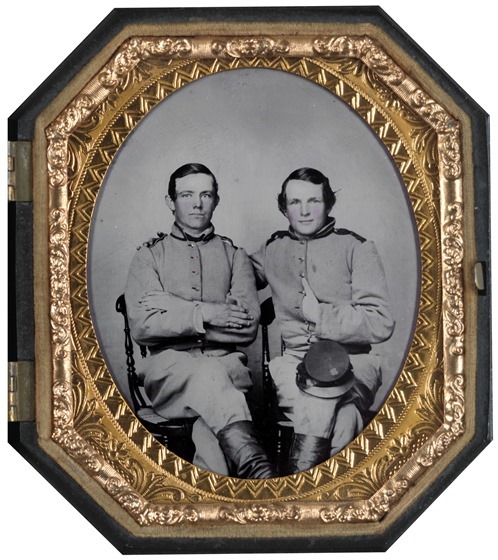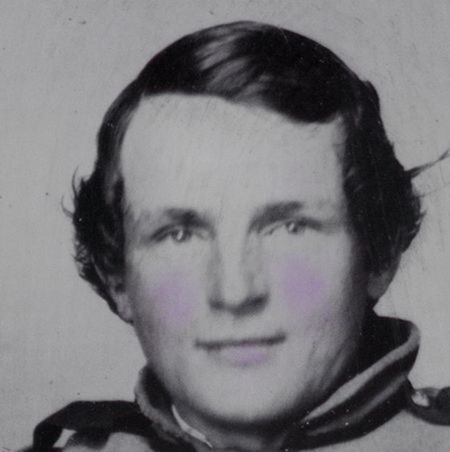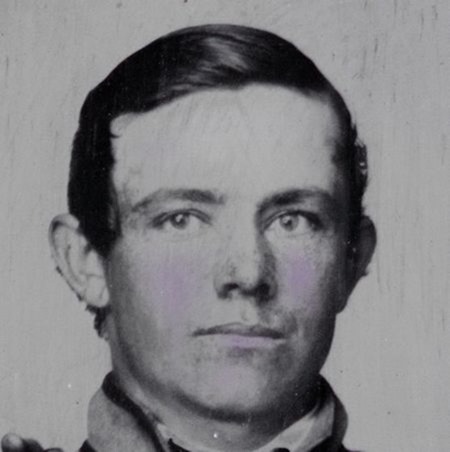Sunday, Dec. 13.—The first anniversary of the battle of Fredericksburg, where we lost so many valuable lives, and where the Federals were thoroughly whipped. Since that time we have lost many lives, which nothing can repay; but we hold our own, have had some victories, and have been upon the whole much blessed by God. At St. James’s Church, this morning, and heard a very fine sermon from the Rev. Mr. Peterkin, from the text, “Blessed are the poor in spirit.” To-night we expect to hear Bishop Lay.
Friday, December 13, 2013
Bridgeport, Sunday, Dec. 13. The heavy rain of yesterday and last night still continued, and in the afternoon it rained much heavier with strong wind which drove it through the tents, rendering everything wet and uncomfortable. Wrote an imperfect letter to Sister Ellen in A. M. The remainder of the day spent in reading Gleason’s Companion which I luckily hit on. Comrades in tent playing “poker” all day “for fun”. Laid down at night in wet blankets and aching bones.
Sunday, 13th. Remained at quarters nearly all day. Rainy in the morning. Read in the Independent. About noon ordered to pack wagons ready to move. Struck tents and all ready. Troops returned to camps and tents again pitched. Begin to worry about Thede. A. B. thinks he had better be discharged. So do I.
Sunday, 13th—We were relieved from picket and arrived in camp about noon. For a wonder we did not have inspection of any kind on this, the Lord’s Day. It rained some this morning, but turned off quite clear in the afternoon.
December 13 — We had copious showers of rain last night, with a strong south wind, but the weather today was warm, clear, and pleasant. This morning our battery was ordered to report to General Lomax again, and at ten o’clock we left and started for Lomax’s camp. We passed through Orange Court House and moved out on the Rapidan Station road till we arrived within about a mile of the river, where we were informed that the Rapidan is not fordable on account of the recent heavy rains. We halted then, and here, and camped. General Lomax’s camp is on the north side of the Rapidan.
Sunday, December 13.—A gloomy, rainy day. We had service in the carriage ward. Rev. Mr. Ransom, a chaplain from Tennessee, preached an excellent sermon. He told us that the Lord was dealing with us as a surgeon would with sick and wounded men; that we were morally sick, and the Lord was giving us bitter medicines.
I looked about the ward, which is very large, and there were the halt, the lame, and the blind, all eagerly drinking in the words of comfort. Miss J. Lowe, a lady of the place, Miss W., Mrs. W., and myself were there. We always made a rule of attending service when it is held in the wards, as we think it gives encouragement to the men.
The reason we have service there is because there are always numbers of wounded men anxious to hear the word of God, and are not able to leave their beds.
The Oaks, St. Helena, December 13, 1863.
I think I see you this Sunday evening all round the stove in the back room upstairs talking over Christmas, and whether I am setting out in the Arago that sails to-morrow is perhaps one of the subjects you are discussing. If nothing detained me like the terrible necessity that does detain me, I suppose I should now have my trunk ready and be sleeping with one eye open so as to watch the dawn and be up in time for the first ferry. But it would be against your approval if I did set out, for it is storming yet, with wind that shakes the house, and lightning; and for several days the sea will be so rough that if I tried it I feel sure I should arrive in Philadelphia more dead than alive. Even after the storm is over the sea will be high, for it is an easterly storm and has lasted now three or four days.
Fort Whipple, Va., Dec. 13, 1863.
Dear Father:
Yours of sunday last was rec’d in due time. Also started off directly to dun: saw Capt. Andrew; he said that there was about $130.00 that he had not collected from the mess, but would wait until next pay day and see if he could get it, and if not take it from his own pocket. As for Capt. Hosmer, I know where he is, being at Washington with the position of Asst. Judge Advocate Genl. Now I can hardly summon the pluck to dun him, being in that position, so I think it would be better to wait until some further day and if any opportunity offers I will improve it.
We are beginning to get acquainted with fancy soldiering now; all have to come out in gloves, being furnished the first time and having to supply yourself the next. It makes a great difference with the looks of the men. Uncle Frank Bricket called over today. I asked him what the prospect was of our ever owning Bradley Farm; he told me (as no doubt he has told you before). It really seems to me that something ought to be done. There has been money spent on the place, if that is all it wants, but it seems to me we are no nearer the end we are after. Uncle Frank spoke of a farm up in Hampstead. How did you like it; presume you would not like to swap? We are very much attached to the old place, all of us; but that should not hinder us from leaving it if we can do better some where else and especially when in the condition we are. I should consider that a very cheap price for a farm (I mean the one he showed you) if as good as he says it is. I do almost feel that the old farm will never amount to any thing. It wants making all over new and that is a very hard task. I should think you would be discouraged after spending nearly all your years so far on it and not coming out better; but it shows the Bradleys never have that failing. How much is the debt now and what interest do you have to pay? I suppose it takes all you have to pay the interest? How does George feel about leaving it and the rest of them? Don’t want to, I’ll bet! Write all particulars and let me know about it for once; you know you never were much for telling your business matters to the rest of the family, and besides it is right I should know. They all say that I am my own master now, but I do not ask that privilege yet, whether or no I have a right to claim it. So far 20 have re-enlisted and I guess that is all that will. Shall send $20 home by uncle Frank, part or nearly all of which is Jerry’s. Things are awfully high at the present time. Love to all. I remain. &c.
L. Bradley, Jr.
Co. B. 1st Mass. H. Arty.
To L. Bradley, Esq.
[His claim as a veteran made him and others consider him “of age.”— Ed.]
Private Reggie T. Wingfield and Private Hamden T. Flay in Confederate uniforms
__________
Close-up crops:
__________
sixth-plate ambrotype, hand-colored ; 9.4 x 8.3 cm (case)
Photographer: Charles R. Rees
Liljenquist Family Collection of Civil War Photographs; Ambrotype/Tintype photograph filing series; Library of Congress Prints and Photographs Division.
Record page for image is here.
__________
 Note – This image has been digitally adjusted for one or more of the following:
Note – This image has been digitally adjusted for one or more of the following:
- fade correction,
- color, contrast, and/or saturation enhancement
- selected spot and/or scratch removal
- cropped for composition and/or to accentuate subject matter
- straighten image
Civil War Portrait 102
by John Beauchamp Jones
DECEMBER 13D.—Rained last night—and this morning we have warm April weather and bright sunshine.
It is getting to be the general belief among men capable of reflection, that no jugglery can save the Confederate States currency. As well might one lift himself from the earth by seizing his feet, as to legislate a remedy. Whatever scheme may be devised to increase the value of the Confederate States paper money, the obligor is the same. For the redemption of the currency (now worth about five cents in specie to the dollar), every citizen, and every description of property, has been pledged; and as the same citizens and the same property must be pledged for the redemption of any newly created currency, there is no reason to suppose it would not likewise run the same career of depreciation. Nor can bonds be worth more than notes. Success in the field, only, can appreciate either; for none will or can be paid, if we fail to achieve independence.
The weather, this afternoon, is warm, calm, and clear; but the roads are too soft for military operations.
I am reading the Memoirs of Bishop Doane, by his son, Rev. William Croswell Doane. He was the great bishop truly; and his son proves an admirable biographer. I knew the bishop personally, and much of his personal history; and hence this work is to me, and must be to many others, very interesting. The coming year is to be an eventful one. We shall be able (I hope) to put 400,000 effective men in the field; and these, well handled, might resist a million of assailants from without. We have the center, they the circumference; let them beware of 1864—when the United States shall find herself in the throes of an embittered Presidential contest!













